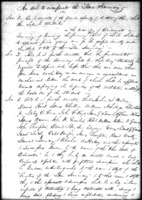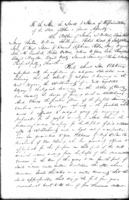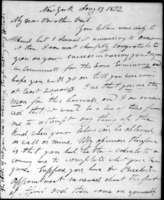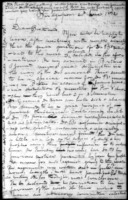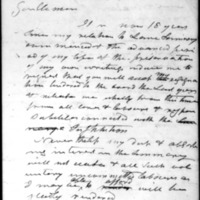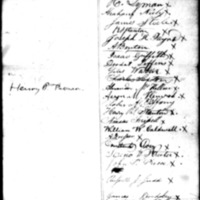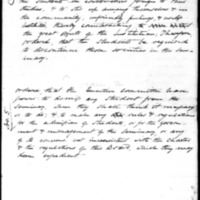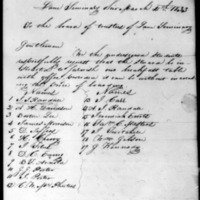Early History of Lane Seminary
In 1828, Ebenezer and William Lane, brothers from New Orleans along with the Kemper family of Cincinnati donated money and land for a new seminary to be founded in Walnut Hills, a neighborhood of Cincinnati, Ohio. This area, including the Ohio River had become an important gateway to the west. People living in the east became pioneers traveling west searching for new land, leading to the expansion of the United States. Many future ministers would be taught here, bringing their new knowledge and Protestantism to spread throughout the western territories. However, these future ministers could not have guessed that they would soon be departing because of their newfound abolitionist ideals. With the financial support of New York philanthropists, Arthur and Lewis Tappan, the seminary had the funding to develop. A Presbyterian board of trustees was created for the new seminary, and Reverend Dr. Lyman Beecher was appointed as president of the seminary in 1832. Beecher became a controversial leader of the seminary, and his decisions on abolition may have led to its ultimate demise.
Brothers Ebenezer and William Lane were successful merchants in New Orleans. In October 1828, they arrived in Cincinnati and requested a meeting with various leaders to offer their financial support for a new school “to promote the interests of the Redeemer’s Kingdom and produce the greatest amount of good.” They agreed to pay a minimum of four thousand dollars per year for the first four years. Thus, the Theological Seminary was established and bore their name.
Reverend James Kemper was born November 23, 1753 in Fauquier County, Virginia. His service as a Revolutionary War soldier brought him West, first to Tennessee then to Kentucky and Ohio. He is most known for his work as a Presbyterian minister in Ohio and Kentucky, and in 1790 became the first person ordained to serve in the Ohio River Valley in Cincinnati. Kemper founded several churches in the area while building his home and family in Walnut Hills, Ohio just a few miles from downtown Cincinnati.
Rev. Kemper and his eldest son Elnathan donated a sixty-acre section of his land in Walnut Hills to begin the new Theological Seminary. The extent of Kemper’s continued financial support for the seminary is unknown, but his son Caleb Kemper was one of its first Trustees serving from 1828 until 1832. Reverend Kemper was a victim of Cincinnati’s cholera epidemic and died August 20, 1834 at the age of 80. His son Elnathan died that same year, also of Cholera.
Brothers Arthur and Lewis Tappan were wealthy merchants, philanthropists and lifelong abolitionists. The elder brother, Arthur was born in 1786 followed by Lewis in 1788. They were born in Northampton, Massachusetts into a devoutly religious family, which included nine additional siblings. The Tappans proved to be expert businessmen when they succeeded with silk importation and built their first fortune in New York. They devoted their wealth and influence on moral causes and this included the establishment of a seminary in the western frontier of Ohio.
The Tappans were serious-minded, conservative gentlemen who believed in temperance and hard work. Two of Lewis’ sons attended the Oneida Institute, which was a manual labor institution where all students had to perform tasks of agriculture to pay a portion of their tuition. This is where the Tappans met a fellow Oneida student named Theodore Dwight Weld. The Tappans were so impressed with Weld’s oratory skills that they hired him as a travelling lecturer to promote the concept of manual labor education. At the completion of this work in 1832, Weld enrolled at the Lane Theological Seminary in Cincinnati. The Tappans promised their financial support to help found the school if it hired Reverend Dr. Lyman Beecher as its first President. In 1833 Arthur and Lewis became founding members of the American Anti-Slavery Society and Arthur served as its President until 1840. They called for immediate abolition of slavery.
Reverend Franklin Y. Vail served as a Lane Seminary trustee from 1833 to 1841. Although we have a letter he authored, there is little else known about him. Through that letter he expressed a friendship with and admiration for Reverend Dr. Lyman Beecher. Vail wrote that Beecher had accepted the position of President and laid out his own suggestions for possible teachers. He was also involved with raising financial support in order to build, staff and sustain the institution. The majority of his correspondence is with a fellow supporter of the Seminary Rev. O. Eastman. In the General Catalogue of Lane Theological Seminary, Vail’s middle initial is shown as a “T”. However, his handwritten letter and those from Eastman clearly indicate a “Y”. Lawrence Thomas Lesick lists Vail’s middle initial as being “Y” in his book, The Lane Rebels.
Little is known about Reverend O. Eastman. We do not know what his first name was, other than it began with O. What we do know is he wrote several of the letters saved in the Lane Theological Seminary records held at the Presbyterian Historical Society. This website contains two letters written by Eastman in New York to Reverend Franklin Y. Vail. Both letters, written in early 1832, demonstrated Eastman’s support for the seminary. He mentioned his financial contributions to the institution and also shared news of Reverend Lyman Beecher and several of Beecher’s adult children.
